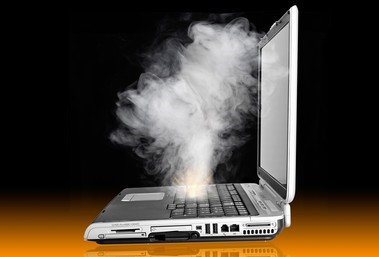
Have you ever wondered why your laptop is taking a longer booting time than it used to take? Why are your programs or applications taking extra time to start? Has your Personal Computer(PC) been heated up? These are some of the usual problems a Personal Computer(or Laptop) user must face. This problem of heating the system is very typical. However, this problem indeed can have some adverse effects on your system. There may be several reasons that can cause your personal computer (or laptop) to face such conditions. Now, heating your personal computer can cause you significant damage. It can slow down your system, cause sudden hanging or delayed start of your computer programs or applications, and sometimes data loss due to the heating up of the system is widespread. However, your system will get heated up due to some essential work. However, heating the system any more than expected is a matter of concern and requires immediate action. So, if you are searching for How to fix the heating issue of your PC, here is the answer: we will be discussing different reasons and solutions or methods that can help you resolve this problem in your system. Strategies that will help you improve the cooling of your system.
How to fix the heating issue of your PC by Understanding your PC and its cooling
Before jumping to methods and techniques to solve the question, i.e., How to fix the heating issue of a PC, it is essential to know what is or are the reasons that cause this problem. Several components of your personal computer are movable and thus heat up. But the CPU and GPU are the parts that constitute most of this heating since they are the parts that generate most of the heat in your system. The excess heating of the plan (Personal Computer) should be controlled, or it can cause severe damage to the performance of your system. If appropriately looked at, you will find a fan installed in your CPU(Central Processing Unit). Computer manufacturers usually do that to keep a constant airflow in the system, to keep it cool. Usually, a single fan is installed in the system, but sometimes manufacturers install multiple fans. The fans installed are one for the CPU and GPU and the second for other components. Some computer systems also come with one or more fans present at the bottom or back. These Personal computer (PC) fans provide extra ventilation to the design and prevent it from overheating. Besides PC fans, there are alternatives to save your Personal Computers or Systems from overheating, like liquid cooling or air conditioning. However, they are not much used and are very hectic regarding maintenance. So, suppose your PC(Personal Computer) is overheating nowadays. In that case, it indicates some issue with your PC's cooling system, or the components are heating up way too much for your system's cooling system.
How to fix this issue with your system
Are you looking for How to fix the heating issue of your PC? Don't worry; some tested methods will solve your problem.
Regularly cleaning your PC
Dirt is the most common reason behind overheating your Personal Computer(or PC). Why? This dirt accumulates on the fans and thus affects their work. If you have not cleaned up your PC for a long time now, it is suggested that you clean it. If you are a desktop user, it will be easy to clean it up, while you should probably go to the repair shop for laptop users. You can follow the below steps to clean your desktop.
The first thing that you need to do is completely turn off your desktop and unplug it. Unplug all the CPU components (Central Processing Unit) like the mouse, keyboard, monitor, speakers, printers, etc. Open the cover of your Personal Computer(PC), which gives you a nice look into it. Blow all your computer components carefully With compressed air or a leaf blower( use this at a prolonged speed). Clean the narrow spaces using cotton or earbuds; do this carefully. Clean all the areas where you think dust might have accumulated. You don't need to clean it until it's crystal clear or something to get rid of the dust that must be creating a blockage to your personal computer.
See for any blockage to the PC vents.
Avoid keeping or placing your computers near the bed, sofas, or soft surfaces. Keeping your system on these or placing them near them can block its vent, resulting in overheating. You should especially take care of this if your cooling system is located at the bottom of the system. Instead of using any hard surface like a wooden table or a laptop tray or anything like that, they will not be a hurdle for your PC to vent the heat out. Thus helping your PC to avoid overheating.
Checking the fan of your PC, see if it is working or not
So, if your computer has just started to overheat, your ventilation system may not work up to the mark. If this is the case, you must clean it or take it to a repair shop. But you need to know whether this is the case and how to check if your computer's fan is working correctly.
You must have heard the sound of the fan as soon as you fire it up. When working correctly, the fan starts at an outstanding speed but slows down eventually as the computer boots up. But you might not hear that sound if your PC's fan malfunctions. That is your cue to clean it or hit a repair or service center. To ensure it further, you can open up your computer if you are sure enough to do so or take it to an expert. See for all the vent-out points for your desktop. If they are clogged, clean them.
If it is the PC components that are generating the heats
So, if you have looked for the problem in the PC(or Personal Computer) fan, it might be your personal computer's components leading your desktop to overheat. It must be that the details are generating a lot of heat, more than what your PC's fan can stand. This problem arises when a lot of your computer is an old one. With the due course in time, the older desktop is more expected to go through this issue. So, if it is not the fans but the components of your PC that make your system overheat, then maybe you can try any of the below and eliminate this problem.
Over-heating of the laptop processor
Overheating the processor is a common reason for restarting the laptop repeatedly. There can be several reasons behind the overheating of a laptop processor. If this is the case, you must take your computer to the service center or any place to help you with this problem. Also, you can clean it with compressed air if you are an advanced user.
Compatibility Issues with the hardware
Sometimes, when two RAM sticks are installed on a single laptop, they may cause the system's random booting. USB Devices can cause this issue, while removing the device may resolve the issue.
Overclocking
For those who don't know what Overclocking here is, it increases the desktop's clock rate more than certified by the manufacturer. The operating voltage is sometimes grown to maintain the operating system's stability. This causes the components to heat up, resulting in overheating of the system.
The counter to this problem is returning to your desktop's clock speed. It will help you save your personal computer's components, and this will also provide you with a temporary rate boost.
Boosting Up your Fan's Speed
Sometimes, you can boost the speed of your fan. Increasing your desktop's cooling aspect may help you eliminate this overheating of your system. There are free programs that can help you to control and monitor the speed of the fan. You can increase or decrease the fan speed as you wish.
This is a tricky method as some motherboards do not allow you to control the fan's speed as you desire. But for such motherboards, you can use external fan controllers to help you cool down your system and prevent it from overheating. It will allow you to control the fan manually.
Removing some of the programs
Everybody loves PC games; no second thoughts about them. These games are one of the most beautiful things on earth. But do you know that PC games or any other heavy software put much pressure on the system? You must have found that they either slow down, hang, or crash while using them. This indicates that these games or software are not meant for your computer.
So, it is advisable to install only those games or software that are compatible with your PC. They use most of your CPU's (Central Processing Unit) power, making it overheat. It's better to remove such games or software, if any.
Cooling Options for Laptop users
Laptops have their cooling system at the bottom. Any obstruction to it will lead your computer to overheat. Surfaces such as blankets, pillows, cushions, or any uneven surface, even your lap, will cause it to overheat when the laptop is kept on any of such characters. So, laptop users should be cautious while placing their laptops on any such cover. It would be best to use a flat wooden table or laptop tray to prevent such a scenario. They will help you to maintain the cooling of your device.
You can also go for laptop coolers or cooling pads; you can see many online. Find one that suits you. Even after all these, your laptop continues to overheat, and it is recommended to be taken to a service center or a repair shop.
Warranty Periods
Suppose everything that is mentioned fails. Don't worry. Other options can help you. If you cannot troubleshoot the problem, check if your laptop still falls under the warranty period. If it does, that will assist you in resolving the issue with your computer. Usually, the warranty period that covers the laptops' hardware is one year. But it can be different for different laptops. Read about how you can check the warranty of other laptops: For Dell Laptops- How To Check Dell Laptop Warranty Easily? (Best Guide 2020) For HP Laptops- How To Check HP Laptop Warranty And Book Appointment (Best Guide 2020) For Asus Laptops- How To Check Warranty Of ASUS Laptop For Acer Laptops-How To Check Acer Laptop Warranty And Book Appointment (Best Guide 2020) For Apple Laptops-How To Check The Warranty Of Apple Laptop (Best Guide 2020) For Lenovo Laptops- How To Check Lenovo Laptop Warranty? (Best Guide 2020) Several other reasons that can drive your laptop to behave in such a way are not mentioned here; if the above methods help solve the problem with your computer, that is good. But if it does not, you should take your laptop to your computer's nearest authenticated service center or any service center you trust.
In Conclusion:
Overheating devices such as personal computers, laptops, or others is pervasive. If your PC or Laptop shows any sign of overheating, you should look into why it has that issue once spotted. Try to counter it with any of the techniques that suit you. Most of the time, the dirt is to be blamed for this problem, and cleaning it off will help your computer, laptop, etc., return to its original state. Even after all of the above fails, taking your device to an expert, repair shop, or service center is better.
NSS Laptop Service Centre
NSS laptop service center is one of the trustworthy go-to places for your laptops and other gadgets. It brings you facilities like online booking for repair, pickup, and delivery, complete diagnosis and repair of your computer or another device, and paying for the service when you receive an electronic item at your doorsteps. They have had a great experience working and resolving problems for various brands and electronic items. They provide Laptop repair, Motherboard repair, printer repair, Desktop repair, etc. All these services are at affordable prices. It is a one-stop place if you have issues with your laptops, desktops, printers, etc.
#fixoverheatinglaptop #overheatingpcsolutions #fixlaptopoverheatingproblem #stoppcoverheating
Frequently Asked Questions
Popular Services
- MacBook Battery Replacement Cost
- HP Printer Repair in Delhi NCR
- Dell Laptop Repair
- HP Laptop Repair
- Samsung Laptop Repair
- Lenovo Laptop Repair
- MacBook Repair
- Acer Laptop Repair
- Sony Vaio Laptop Repair
- Microsoft Surface Repair
- Asus Laptop Repair
- MSI Laptop Repair
- Fujitsu Laptop Repair
- Toshiba Laptop Repair
- HP Printer Repair Pune
- Microsoft Surface Battery Replacement
- Microsoft Surface Screen Replacement




